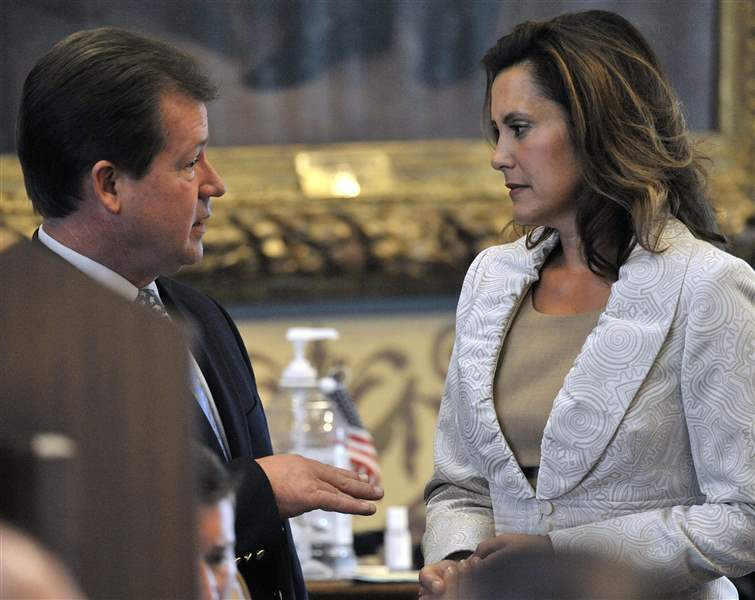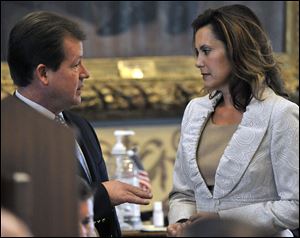
COMMENTARY
Despite trends, wins not assured for Michigan Democrats in 2018
11/2/2017

Former Michigan Senate Majority Leader Randy Richardville and Senate Minority Leader Gretchen Whitmer in 2013. Whitmer is the front-runner to be the Democratic nominee for governor.
ASSOCIATED PRESS
DETROIT — Every historical and national trend indicates that 2018 should be a huge year for Michigan Democrats.
But there are indications that party leaders are worried.
Nobody wants to say anything on the record. But there are concerns that their candidate for governor may not be strong enough — and that Democrats’ habit of insisting on an “ethnically balanced” ticket could once again backfire.
The reasons for thinking Democrats should do well are easy enough to see. Nationally, the party holding the White House traditionally loses governorships, legislative seats, and seats in Congress in midterm elections.

Former Michigan Senate Majority Leader Randy Richardville and Senate Minority Leader Gretchen Whitmer in 2013. Whitmer is the front-runner to be the Democratic nominee for governor.
And when it comes to their governors, Michigan voters have traditionally changed parties every eight years.
This year, Democrats have an added bonus in that Gov. Rick Snyder is hugely unpopular.
Republicans also have held both houses of the Legislature since 2010 and cannot credibly blame the Democrats for failing to fix the state’s infrastructure.
On paper, Democrats ought to be able to sweep the governor’s race and the other major statewide offices.
But here’s why that may not happen:
● Governor’s race: Former Senate Minority Leader Gretchen Whitmer, 46, of East Lansing, is the clear front-runner. She is smart, warm, and an excellent speaker.
Most establishment Democrats have endorsed her, especially after U.S. Rep. Dan Kildee (D., Flint) and Mark Bernstein, a University of Michigan trustee and the scion of a famous legal family in Detroit decided not to run.
Her main remaining opponents are Abdul El-Sayed, a charismatic 32-year-old Arab-American who has raised more than $16 million and drawn considerable national notice as possibly the nation’s first Muslim governor, and Shri Thanedar, an eccentric but unknown businessman who has dumped more than $5 million of his own money into the race.
Polls show that Ms. Whitmer leads these candidates, and a couple other unknowns, by huge margins.
But the likely Republican nominee, 64-year-old Michigan Attorney General Bill Schuette, is a smart and ruthless politician who has wanted to be governor for years.
Mr. Schuette has signaled he plans to portray Ms. Whitmer as a cross between the state’s last governor, the ineffective Jennifer Granholm, and Hillary Clinton, the only Democratic presidential candidate to lose Michigan since 1988.
Mr. Schuette has his own weak points; he has been appealing primarily to the hard right, and hurt himself with women’s groups during a ham-handed and failed attempt to prevent two gay nurses from adopting three special-needs infants who the state had given them to care for.

Lessenberry
But he is relentless, and in an effort to separate himself from Mr. Snyder, he has been aggressively prosecuting some of the governor’s appointees in the Flint crisis and has hinted the governor may not be immune.
Despite recent efforts, and endorsements by several African-American leaders, Ms. Whitmer remains a largely unknown quantity in Metropolitan Detroit, where huge and enthusiastic turnouts are essential for any Democrat.
Nor, despite some union endorsements, does she have close ties to the blue-collar workers who were once reliably Democratic and who gave Mr. Trump his upset victory last year.
As an indication that some Democrats are worried, Andy Levin, the son of longtime congressman Sander Levin, has been considering getting into the governor’s race.
Now an executive running his own clean energy company, the younger Levin said “politics is really about a question of who the right candidate is at the right moment,” and indicated he was trying to determine whether Ms. Whitmer could win.
● Michigan attorney general: Democrats used to own this office; Frank Kelley, known as the “eternal general,” held it for 37 years. But Republicans have held it since 2002.
Dana Nessel, a skilled attorney with a long record of looking out for the downtrodden, wants the job. She also spent years successfully prosecuting bad guys as an assistant Wayne County Prosecutor, and ran rings around Mr. Schuette’s lieutenants in the same-sex adoption case.
However, some are worried lest there may be “too many women” on the ticket, and Democratic Party orthodoxy stipulates the statewide ticket has to include an African-American. Accordingly, the eventual nominee may be Pat Miles, the former U.S. district attorney for western Michigan.
Some progressives, however, worry that he has too many corporate ties and question his abilities as a speaker.
● Secretary of state: This is perhaps the brightest spot for Democrats. Their all-but-certain nominee, former Wayne State Law School Dean Jocelyn Benson, has formidable qualifications and fund-raising ability; so far, the only GOP names mentioned are third-tier politicians at best.
But as of now, Democrats are worried that Trump fatigue may not automatically translate into victory for them.
Jack Lessenberry, the head of the journalism faculty at Wayne State University in Detroit and The Blade’s ombudsman, writes on issues and people in Michigan. Contact him at: omblade@aol.com.